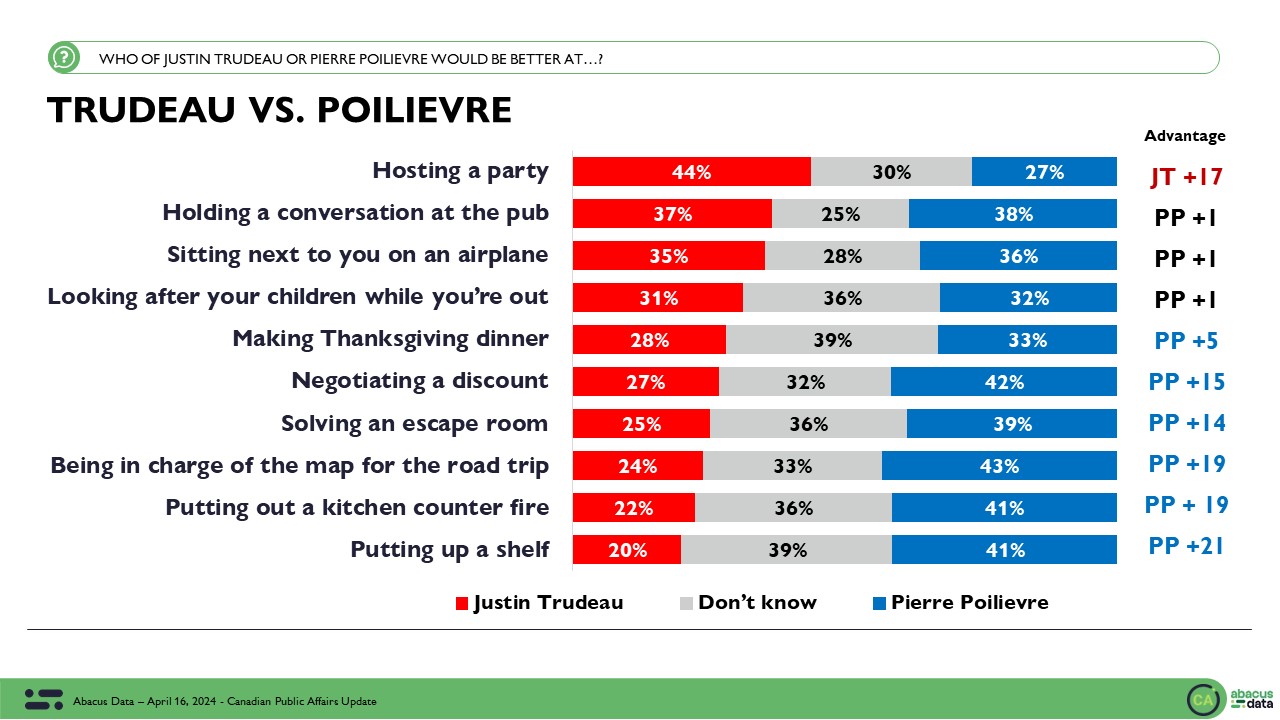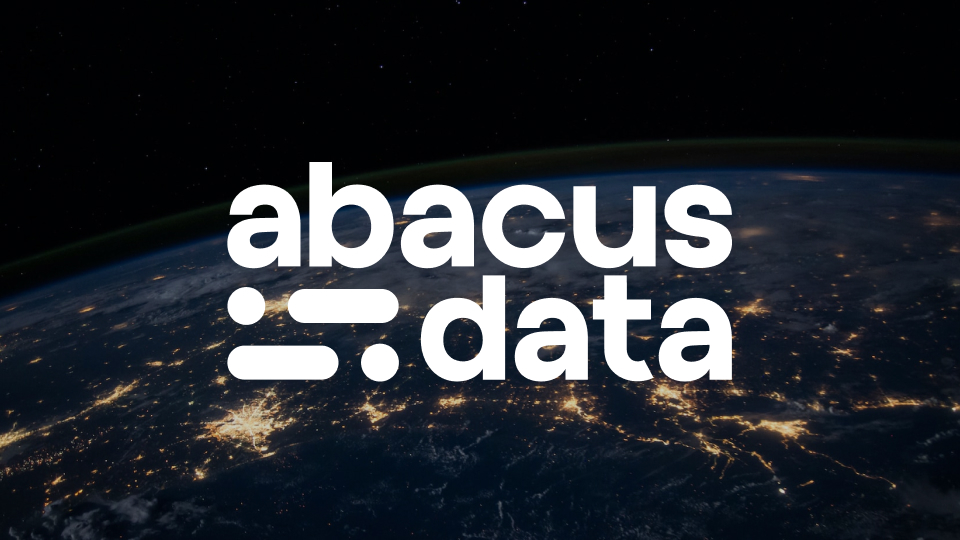You vaxxed? Millions are asking each other and relationships might hang in the balance
July 27, 2021
The latest Abacus Data research explored how Canadians are feeling about vaccination against Covid-19. Our polling is based on a representative sample of the adult Canadian population, as our sampling includes people 18 and older.
Here’s what we found:
• 84% of adults accept being vaccinated, 8% are hesitant about it, and 8% refuse.
• If we assume a base adult population of 29.5 million adults, our findings can be extrapolated to indicate 17.4 million have had both shots, 6.2 million say they’ve had one and are ready to get the second, and 1.2 million have had none yet but are ready and willing to get a shot. In total, 24.8 million of 29.5 million adults appear to be accepting of Covid vaccination.
• 2.4 million adults could be characterized as hesitant, made up of 1.48 million who say they prefer to wait a bit before getting a shot, and 885,000 who say they would prefer not to be vaccinated but could be persuaded to take a shot. At the beginning of March, 30% said they were hesitant so that the movement down to 8% is very significant.
• Another 2.4 million, or 8% of the adult population say they will not get vaccinated under any circumstances. At the beginning of March, 8% was the number taking this position. Essentially the availability of vaccines, evidence of their safety and efficacy, promotional efforts and influencer endorsements – together have had no apparent effect on the level of refusal.

Just under half of the adult population ask other people if they’ve been vaccinated against Covid19 quite a bit or very often. 55% of those who’ve had both shots ask quite a bit or very often. Among those who refuse to get vaccinated, 71% never ask.
The plurality (44%) say “given the huge impacts of covid on other people and the economy, everyone should be required to get vaccinated unless they have a medical reason for not being vaccinated”, while 38% say “people should be able to choose whether to be vaccinated or not, but if they choose not to it is reasonable to limit their access to some places”, while 19% say “being vaccinated or not should be a matter of choice and those who choose not to should be treated no differently than anyone else.”
However, this national average response obscures a massive gulf in responses between the fully vaxxed and vax refusing Canadians. 94% of vaccinated Canadians believe that some restrictions should apply to non-vaccinated people and 92% of vaccine refusing Canadians reject that idea.
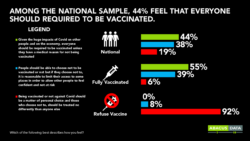
We found more evidence that refusal has significant potential to cause divisions in society.
• When they encounter someone who refuses to take a Covid vaccination, 40% said they think less of the person for “making a bad choice for themselves and for putting other people and the economy at risk.” There is something of a generational divide on this question. Most of those 60 and older (56%) think less of a vaccine refuser, while most of those under 30 say they don’t. (65%). A much bigger divide is evident between the fully vaccinated and vaccine refusers. Just over half of those who have been fully vaccinated think negatively about those who are refusing to be vaccinated.
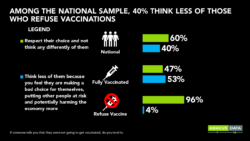
• 45% would “avoid seeing a friend or relative who refused to get vaccinated in person as much as possible”. 60% of those 60 and older say they would avoid unvaxxed friends or relatives. The majority of those on the left say they would avoid a vax-refusing friend or relative (53%). The majority of those on the right wouldn’t. (62%) Among the fully vaccinated 57% would avoid friends or relatives who refuse vaccination. Among vaccine refusers, 97% would be comfortable being with another unvaccinated person.
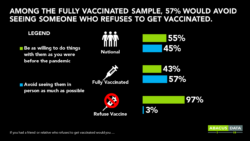
Most (69%) think any extension of COVID wage benefits should not be available to people who refuse to get fully vaccinated. Among the fully vaccinated, 82% feel this way. Among those who refuse to be vaccinated 94% disagree.
When it comes to a possible extension of COVID business supports, 73% believe these should only be extended to businesses that strongly encourage employees to be fully vaccinated. 86% of the fully vaccinated feel this way, while 90% of vaccine refusers reject this idea.
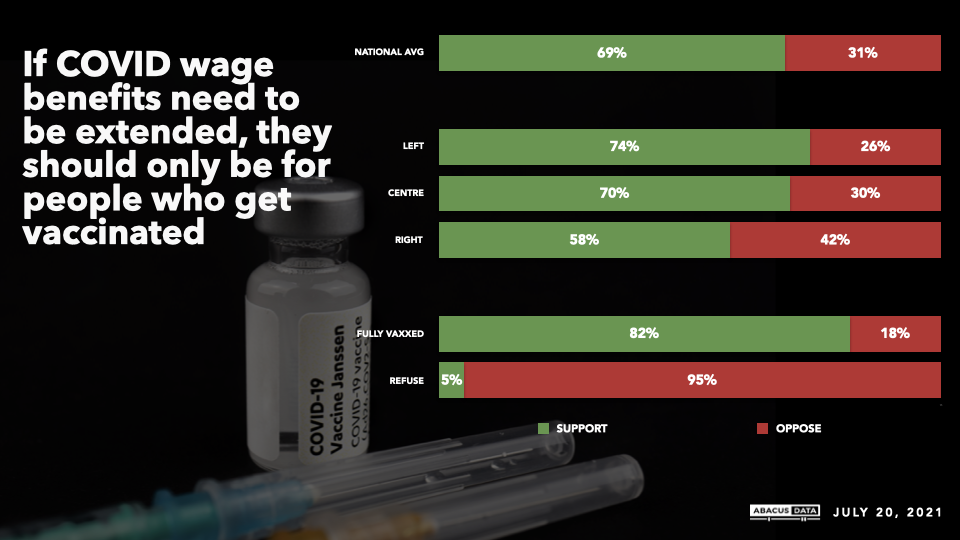
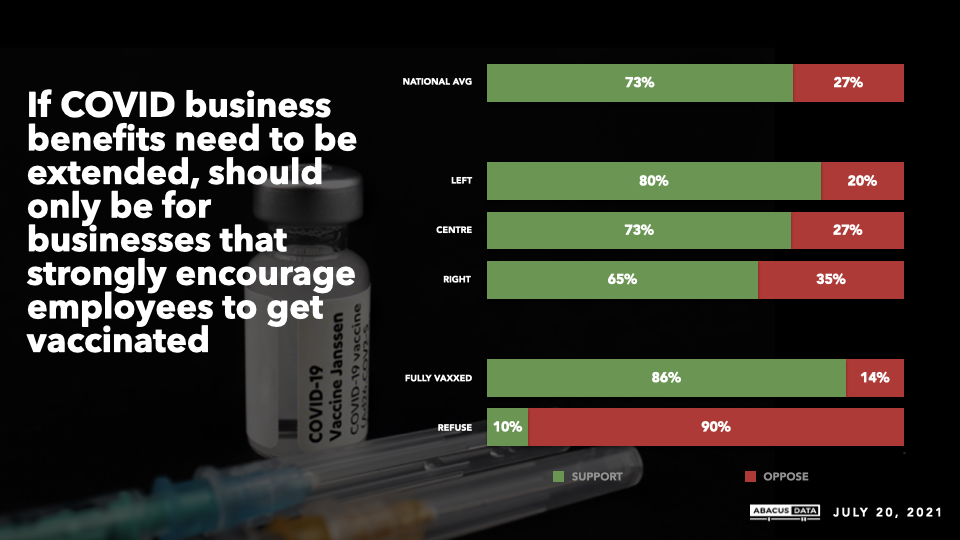
UPSHOT
According to Bruce Anderson: “There has been a lot of unity among Canadians about the pandemic and the need for safety and constraints on behaviours that could spread the virus. We appear to be at an inflection point now where that unity could be tested. If our vaccination pace stalls and infections start to rise again, our findings show that divisions around vaccination could become pretty significant.
The number of vaccine refusers is steady at a level that may not prevent community immunity – so perhaps what hangs in the balance is the decisions made by the 2.4 million Canadians who are hesitant – willing to be persuaded of the merits, the safety and open to arguments about the consequences of too much refusal, in terms of health and economic impacts.”
According to David Coletto: “The vaccinated public’s patience for those who choose to not be vaccinated is not unlimited. At some point, support for policy choices – both from the government as well as from businesses – that require vaccination will become more widespread and deeper. From a purely political perspective – the 82% who favour restrictions on what unvaccinated people can do will likely win if the unvaccinated are seen as economic, social, or health threats to individuals or the broader society. I expect this divisions to deepen if vaccination rates stall.”
METHODOLOGY
The survey was conducted with 1500 Canadians residents from July 14 to 19, 2021. The data were weighted according to census data to ensure that the sample matched Canada’s population according to age, gender, educational attainment, and region. The sample was sourced from double opt-in survey panels, blended to manage out potential skews in the data from a single source.
The margin of error for a comparable probability-based random sample of the same size is +/- 2.6%, 19 times out of 20. Totals may not add up to 100 due to rounding.
The data were weighted according to census data to ensure that the sample matched Canada’s population according to age, gender, educational attainment, and region. Totals may not add up to 100 due to rounding.
ABOUT ABACUS DATA
We are the only research and strategy firm that helps organizations respond to the disruptive risks and opportunities in a world where demographics and technology are changing more quickly than ever.
Find out more about what we are doing to help clients respond to the COVID-19 pandemic.
We are an innovative, fast-growing public opinion and marketing research consultancy. We use the latest technology, sound science, and deep experience to generate top-flight research-based advice to our clients. We offer global research capacity with a strong focus on customer service, attention to detail and exceptional value.
We were one of the most accurate pollsters conducting research during the 2019 Canadian Election.
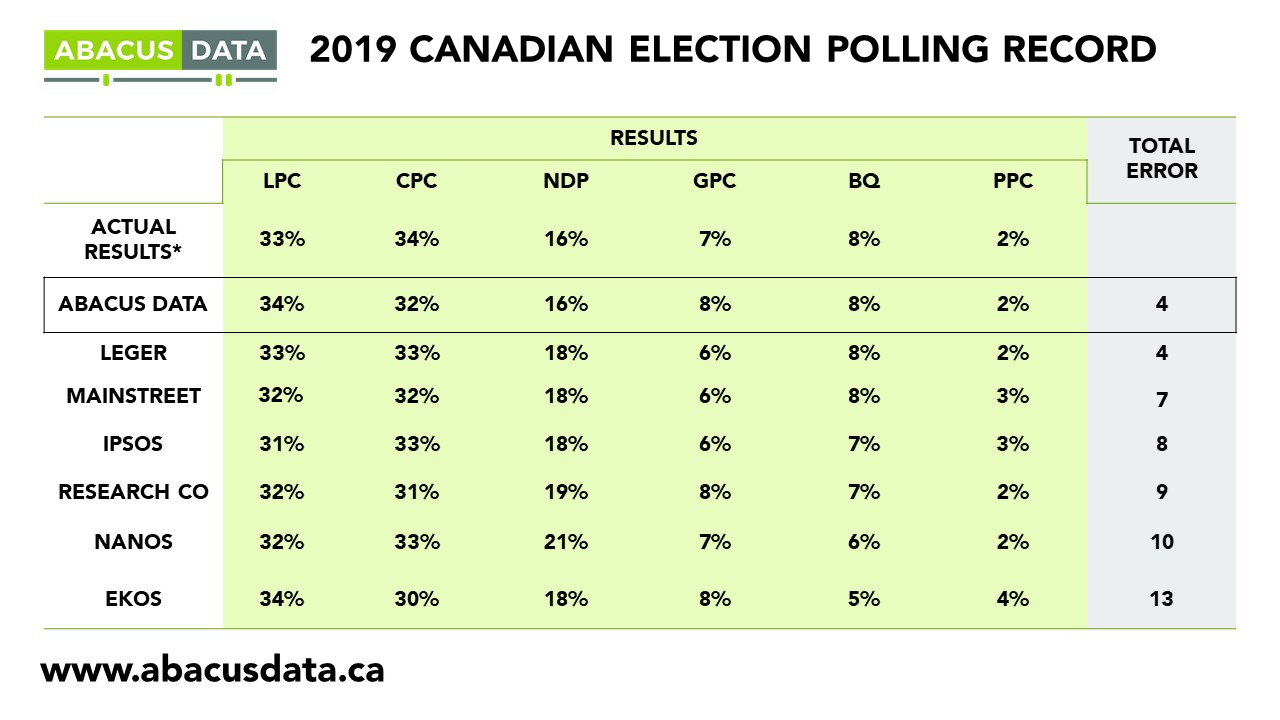
Contact us with any questions.
Find out more about how we can help your organization by downloading our corporate profile and service offering.



